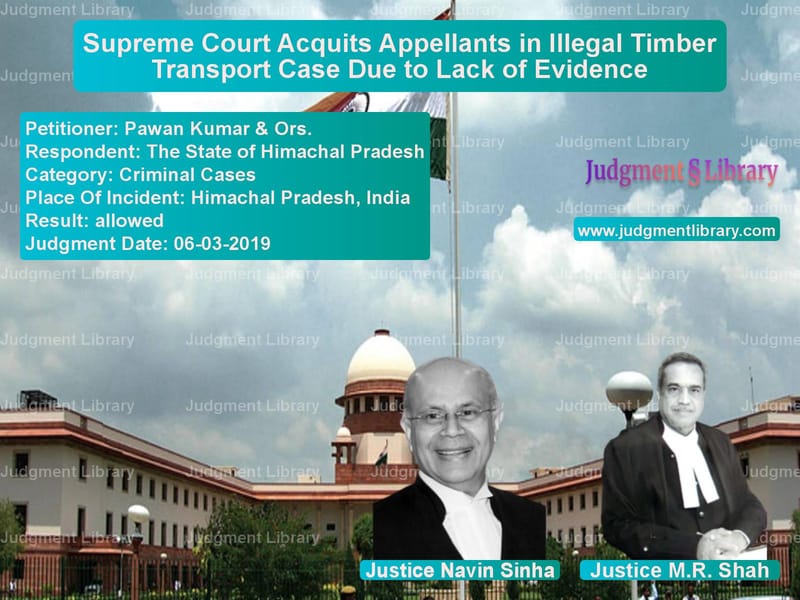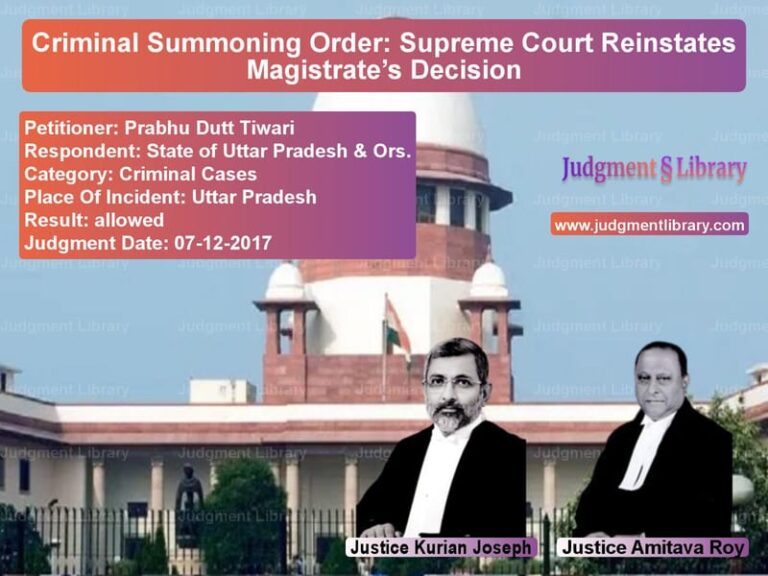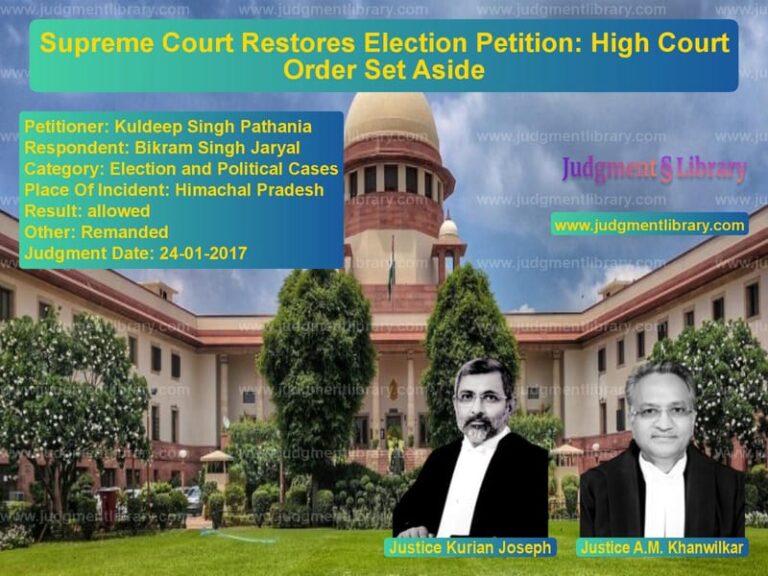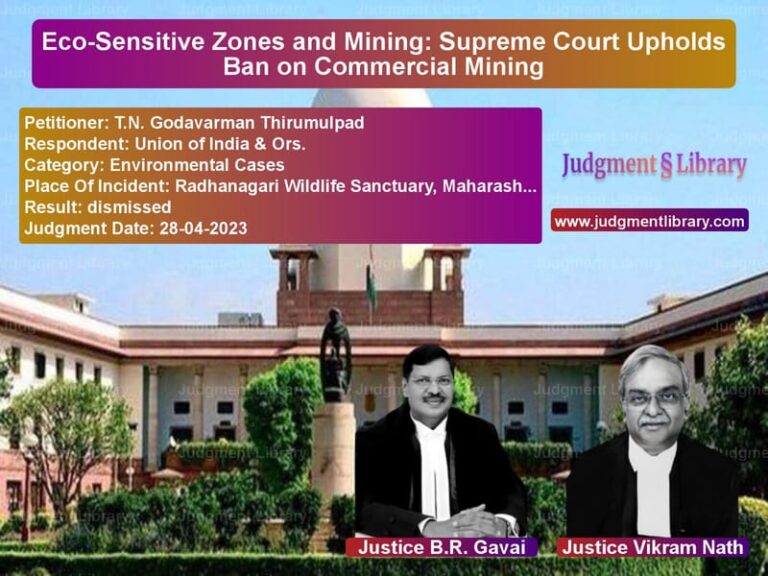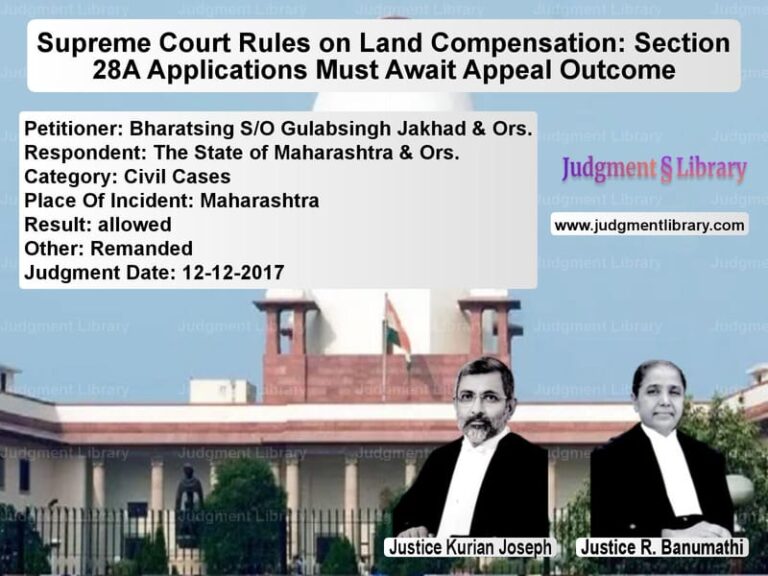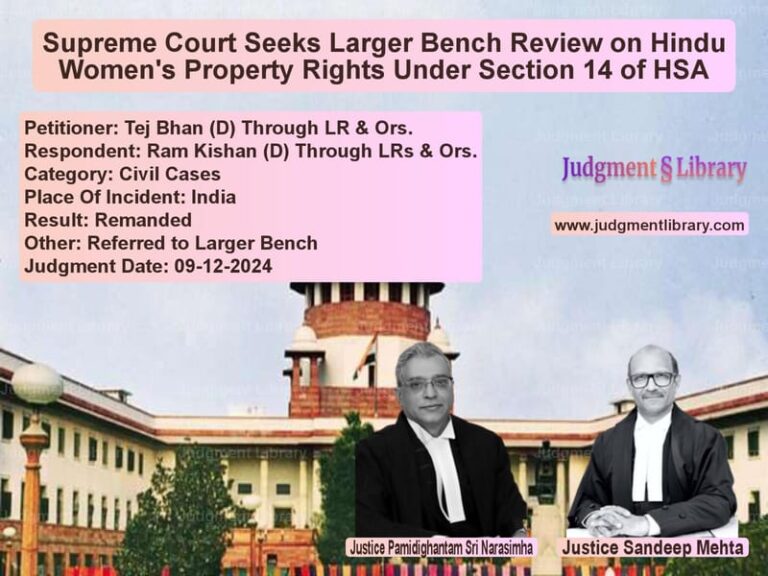Supreme Court Acquits Appellants in Illegal Timber Transport Case Due to Lack of Evidence
The case of Pawan Kumar & Ors. vs. The State of Himachal Pradesh revolves around allegations of illegal timber transportation under the Indian Forest Act, 1927. The Supreme Court ultimately acquitted the appellants due to insufficient evidence, highlighting the importance of proper legal procedures in securing convictions.
Background of the Case
The appellants were apprehended while transporting 22 logs of Khair wood without any authorization or permit. The State of Himachal Pradesh initiated criminal proceedings against them, charging them under Section 379 of the Indian Penal Code (IPC) (theft) and Sections 41 and 42 of the Indian Forest Act, 1927 (unauthorized removal of forest produce).
The trial court acquitted the appellants of theft under Section 379 IPC but convicted them under the Forest Act, sentencing them to six months of imprisonment.
Legal Issues Before the Supreme Court
The main legal issues in this case were:
- Whether the non-production of the seized wood and the vehicle weakened the prosecution’s case.
- Whether mere possession of a seizure memo was sufficient to establish guilt under the Forest Act.
- Whether the High Court was justified in reversing the acquittal granted by the Sessions Court.
Arguments by the Petitioner (Pawan Kumar & Ors.)
- The appellants argued that the logs and the vehicle were never produced in court, making it impossible to verify the claims made by the prosecution.
- The independent witness to the seizure did not support the prosecution’s claims, making the evidence unreliable.
- The High Court erred in reversing the acquittal based on a mere seizure memo without substantial supporting evidence.
- The sample log presented in court could not be conclusively linked to the 22 logs allegedly seized from the vehicle.
Arguments by the Respondent (State of Himachal Pradesh)
- The State contended that the seizure memo bore the signatures of the independent witness, which was sufficient to prove that the timber was confiscated from the appellants.
- The High Court had rightly concluded that the non-production of the entire consignment of logs did not weaken the prosecution’s case.
- The sample log presented in court was representative of the seized timber and was adequate to establish the offense.
Supreme Court’s Analysis and Judgment
The Supreme Court critically examined the evidence presented by both sides and found the prosecution’s case lacking in key aspects. The Court made the following significant observations:
- “Non-production of the seized wood and the vehicle, the primary evidence of the offense, renders the prosecution case fragile and unsustainable.”
- “Mere production of the seizure memo does not tantamount to the production of the seized woods and the lorry.”
- “Unless the seized wood was produced, mere production of a sample, and there is no material in support that the sample was out of the same 22 logs, we are unable to sustain the conviction of the appellants.”
Final Judgment
The Supreme Court ruled as follows:
- The appellants were acquitted of all charges due to insufficient evidence.
- If the appellants had already served their sentences, they would still be deemed acquitted.
- The High Court’s order reversing the acquittal was set aside, reinstating the Sessions Court’s decision.
Significance of the Judgment
This ruling underscores several key legal principles:
- Prosecution must present concrete evidence beyond reasonable doubt to secure a conviction.
- The physical production of seized goods is crucial in cases involving alleged possession of contraband.
- Courts should be cautious while reversing acquittals without strong factual and legal backing.
Conclusion
The Supreme Court’s decision in Pawan Kumar & Ors. vs. The State of Himachal Pradesh sets an important precedent for cases involving alleged illegal transportation of forest produce. By emphasizing the need for substantial evidence, the Court reinforced the principle that convictions cannot be based on assumptions or incomplete records. This ruling serves as a reminder of the stringent burden of proof required in criminal trials to prevent wrongful convictions.
Petitioner Name: Pawan Kumar & Ors..Respondent Name: The State of Himachal Pradesh.Judgment By: Justice Navin Sinha, Justice M.R. Shah.Place Of Incident: Himachal Pradesh, India.Judgment Date: 06-03-2019.
Don’t miss out on the full details! Download the complete judgment in PDF format below and gain valuable insights instantly!
Download Judgment: Pawan Kumar & Ors. vs The State of Himacha Supreme Court of India Judgment Dated 06-03-2019.pdf
Direct Downlaod Judgment: Direct downlaod this Judgment
See all petitions in Fraud and Forgery
See all petitions in Theft and Robbery Cases
See all petitions in Custodial Deaths and Police Misconduct
See all petitions in Judgment by Navin Sinha
See all petitions in Judgment by Mukeshkumar Rasikbhai Shah
See all petitions in allowed
See all petitions in supreme court of India judgments March 2019
See all petitions in 2019 judgments
See all posts in Criminal Cases Category
See all allowed petitions in Criminal Cases Category
See all Dismissed petitions in Criminal Cases Category
See all partially allowed petitions in Criminal Cases Category

